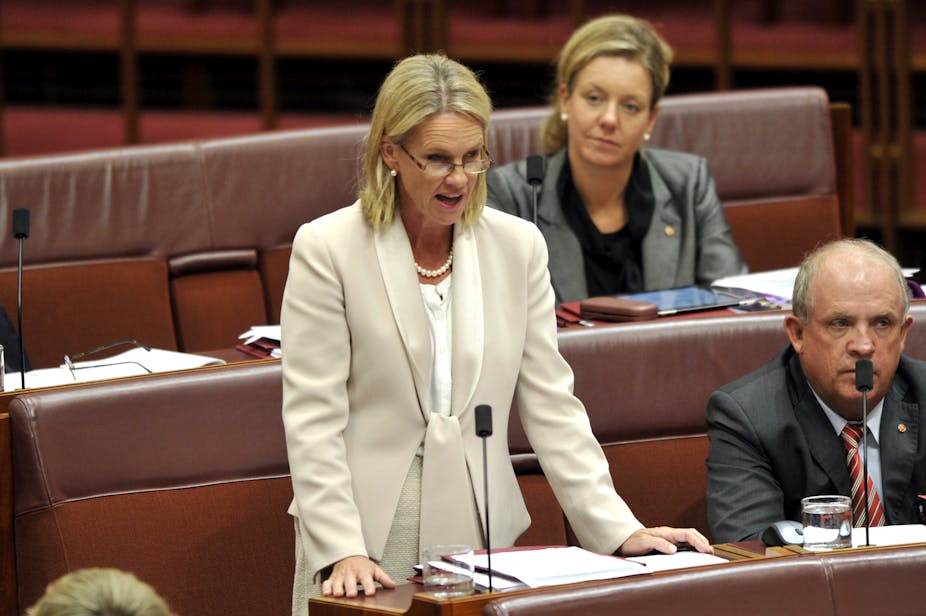Furore over links between Assistant Minister for Health Fiona Nash’s office and industry continues today with revelations that her former chief of staff is connected to the alcohol, as well as the food industry.
Alastair Furnival resigned last Friday over his role in shutting down a website about the health star rating food labelling system and it’s now been revealed that he played a key role in cancelling the funding of the Alcohol and other Drugs Council of Australia.
Furnival is co-owner of a lobbying firm that has represented major food companies opposed to the new front-of-pack labelling system. According to Fairfax, he and his wife also co-own a company, which, in turn, owns another that lobbied for the alcohol industry in 2012.
Such conflicts of interest place question marks over an individual’s capacity to judge a situation, perform a duty or make a decision in a fair and impartial manner. But what if a public institution, such as the Department of Health itself, has conflicted interests?
Furnival’s conflict of interest is worrying and should be thoroughly scrutinised. But the influence of the food and alcohol industries at the institutional-level precedes Furnival and will continue despite his resignation.
A growing closeness
The Australian Food and Grocery Council (AFGC) and the health department have developed close ties in recent years. Senior executives of the Council sat on the Dietary Guidelines Working Committee and the National Preventive Health Taskforce.
It co-funded a major nutritional health research survey with the health department in 2007, and is a prominent member of the Food and Health Dialogue.
At the 2009 AFGC annual dinner, Nicola Roxon, then-minister for health said these relationships weren’t cause for concern. Roxon welcomed the industry’s partnership with health prevention strategies and research projects, adding that she “saw no reason for people to fear industry engagement – quite the opposite”.
Perhaps. But when the aim of the food and grocery council is to “influence federal and state policies to ensure our members’ views are represented at the highest level”, legitimate questions arise about whether these partnerships conflict with the work of the health department.
Lawrence Lessig, professor of law and director of the Edmond J. Safra Center for Ethics at Harvard University, warns that such partnerships can corrupt an institution by creating:
an economy of influence that illegitimately weakens the effectiveness of an institution especially by weakening the public trust of the institution.
So does the health department’s relationship with the food and grocery council weaken its effectiveness and public trust of the institution? For many, the answer is yes.
Keeping everyone happy?
In 2011, the health department responded to the Blewett Review of food labelling law and policy by rejecting the major recommendation of a traffic-light front-of-pack labelling system. Journalists, public health researchers and consumer groups all believed the decision was due to the food and grocery council’s influence.
Catherine King, then-parliamentary secretary for health, defended the decision in an interview with the ABC. King explained the traffic-light scheme would “be a fairly big change for industry” and decided that “we need to get public health and industry together to try and…look at another system”.
This led to the Forum on Food Regulation, a collaborative process involving the AFGC, public health researchers and health department officials. The Forum’s objective was to develop a front-of-pack food labelling system that “must strike a balance between seeking to ensure good public health outcomes and ensuring a strong and profitable food industry”.
But are these objectives compatible? If a profitable industry undermines public health, is a balance feasible? And does the attempt to reach a balance weaken the effectiveness of the health department, the institution that arbitrates this relationship?
A profitable food industry is certainly in the nation’s economic interest. But the idea that it should be a primary concern for the health department rubs against its more obvious objective of ensuring public health.
Individual conflicts of interest can cause significant damage – Furnival and those responsible for his appointment need to be fully investigated. But whether the increasing acceptance of public-private partnerships is the best way to ensure public goods needs critical attention. These partnerships have the potential to undermine public trust and weaken the effectiveness of vital public institutions.
The public needs to be confident that public officials and public institutions are acting in their interest. Recent events at the individual and institutional level imply that such confidence is misplaced.
CORRECTION: This article has been amended to reflect that the name of the health department recently changed from Department of Health and Ageing to Department of Health. The error was introduced during the editing process.

